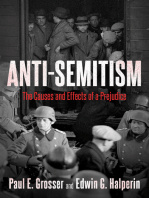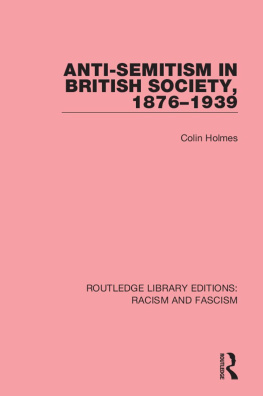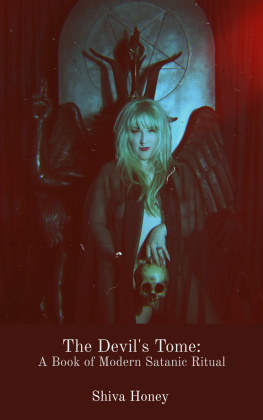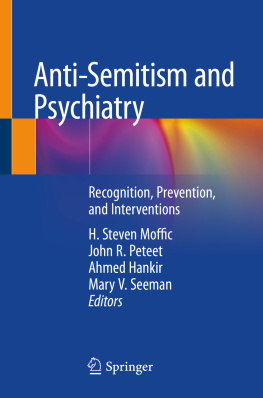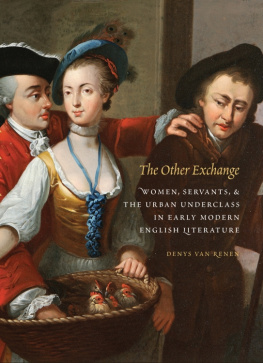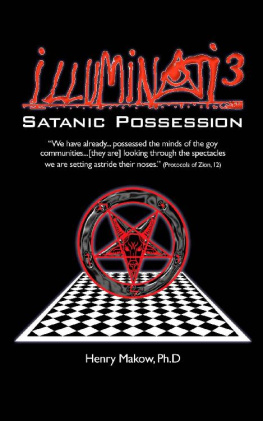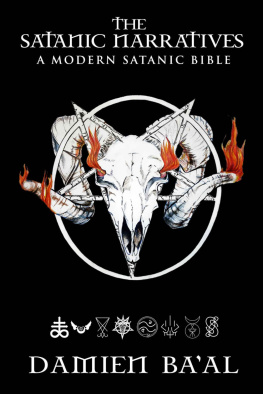Contents

MASCULINITY, ANTI-SEMITISM AND EARLY MODERN ENGLISH LITERATURE
Women and Gender in the Early Modern World
Series Editors: Allyson Poska and Abby Zanger
In the past decade, the study of women and gender has offered some of the most vital and innovative challenges to scholarship on the early modern period. Ashgates new series of interdisciplinary and comparantive studies, Woman and Gender in the Early Modern World, takes up this challenge, reaching beyond geographical limitations to explore the experiences of early modern women and the nature of gender in Europe, the Americas, Asia, and Africa. Submissions of single-author studies and edited collections will be considered.
Titles in this series include:
Printing and Parenting in Early Modern England
Edited by Douglas A. Brooks
Shall She Famish Then?
Female Food Refusal in Early Modern England
Nancy A. Gutierrez
Staging Slander and Gender in Early Modern England
Ina Habermann
Midwiving Subjects in Shakespeares England
Caroline Bicks
Subordinate Subjects
Gender, the Political Nation, and Literary Form in England, 15881688
Mihoko Suzuki
Poetic Resistance
English Women Writers and the Early Eodern Lyric
Pamela S. Hammons
Masculinity, Anti-Semitism and Early Modern English Literature
From the Satanic to the Effeminate Jew
MATTHEW BIBERMAN
University of Louisville, USA

First published 2004 by Ashgate Publishing
Published 2016 by Routledge
2 Park Square, Milton Park, Abingdon, Oxon OX14 4RN
711 Third Avenue, New York, NY 10017, USA
Routledge is an imprint of the Taylor & Francis Group, an informa business
Copyright Matthew Biberman 2004
The author has asserted his moral right under the Copyright, Designs and Patents Act, 1988, to be identified as the author of this work.
All rights reserved. No part of this book may be reprinted or reproduced or utilised in any form or by any electronic, mechanical, or other means, now known or hereafter invented, including photocopying and recording, or in any information storage or retrieval system, without permission in writing from the publishers.
Notice:
Product or corporate names may be trademarks or registered trademarks, and are used only for identification and explanation without intent to infringe.
British Library Cataloguing in Publication Data
Biberman, Matthew
Masculinity, anti-semitism and early modern English literature : from the satanic to the effeminate Jew. (Women and gender in the early modern world)
1. English literature Early modern, 1500-1700 History and criticism 2. Jews in literature 3. Antisemitism in literature 4. Misogyny in literature 5. Masculinity in literature
I. Title
820.935282960903
Library of Congress Cataloging-in-Publication Data
Biberman, Matthew, 1966
Masculinity, anti-semitism and early modern English literature : from the satanic to the effeminate Jew / Matthew Biberman.
p. cm. (Women and gender in the early modern world)
Includes bibliographical references and index.
ISBN 0-7546-5045-6 (alk. paper)
1. English literature Early modern, 1500-1700 History and criticism. 2. Jews in literature. 3. Antisemitism England History 16th century. 4. Antisemitism England History 17th century. 5. Jews England History 16th century. 6. Jews England History 17th century. 7. Antisemitism in literature. 8. Masculinity in literature. 9. Satanism in literature. 10. Sex role in literature. I. Title. II. Series.
PR151.J5B53 2004
820.93529924--dc22
2004005394
ISBN 13: 978-0-7546-5045-4 (hbk)
ISBN 13: 978-1-138-25797-9 (pbk)
This book is for
Martha and Lucy
One of the lessons of the Hitler period is the stupidity of cleverness. How many were the expert arguments with which Jews dismissed the likelihood of Hitlers rise, when it was already as clear as daylight.
Max Horkheimer and Theodor W. Adorno
Dialectic of Enlightenment: Philosophical Fragments
The true God hates us, but we have dreamed up an idol who loves us and has made us His chosen people. You said it yourself: The Gentiles makes gods of stone and we of theories.
Isaac Bashevis Singer
Enemies, A Love Story
Contents
1 His stones, his daughter, and his ducats:
The Jew-Devil, the Jew-Sissy and the Theo-Sexual Matrix
3 By thee adulterous lust was drivn from men:
Donne, Milton and the Rise of the Jew-Sissy
4 She proving false, the next I took to wife:
Divorce Law and Violence in Jonson, Cary and Milton
5 He is imitating nobody, and he is inimitable:
T. S. Eliot and the Antisemitic Aesthetics of the Milton Controversy
6 When King Laugh come he make them all Dance:
The Gothic Reconstitution of the Jew-Devil
This project derives from my doctoral work. While a student I found Duke Universitys English department and Literature program to be especially rewarding. I am forever grateful to the members of my dissertation committee: Stanley Fish, Fredric Jameson, Thomas Pfau, Tom Ferraro, and Robert Gleckner. I wish Professor Gleckner were alive to receive my thanks and I know this book would have been a better one if he were still here.
The debts I owe to friends and colleagues are many. Erika Gaffney at Ashgate has been generous with her time, patiently working with me to insure that the finished product would be up to her high standards. The anonymous readers she secured also provided valuable input. Susan Ryan generously read and responded to a draft of the entire manuscript, helping me to find my arguments footing. Ben Saunders continues to teach me much about the stealing of scraps from the great feast of languages; may he continue to live long on the alms-basket of words. Andrew Cole provided a medievalists eye when asked for his assistance. John Rossini kindly shared with me his own on-going work on Shakespeares Merchant. In correspondence John Shawcross supplied a steady hand and encouraging words at a time when I needed it. My students help has been enormous, for which I now offer this simple thanks.
My colleagues at the University of Louisville have provided me with a wonderful environment in which to pursue my investigations. Debra Journet and Susan Griffin have both been excellent Chairs of the English Department, always alert to opportunities to enable scholarship, especially among the junior faculty. With their aid, I was able to secure crucial assistance in the way of a research initiation grant from the University, and I would like to thank the Dean of Research for this award.
Formative work leading up to this book appeared in several venues. I published early essays exploring the presence of Judaic / Hebraic material in John Miltons work in Studies in English Literature and in the Milton Quarterly. My chapter in the festschrift Romantic Generations: Essays in Honor of Robert F. Gleckner extended this theme through an investigation into what I then called the Christian Hebraic roots of English republicanism. I am grateful to the editors and readers associated with all of these publications.
I would also like to thank those staff members at Harvard University and the Huntington Library who so generously assisted me in my research efforts. Special thanks go to the following individuals: David A. Cobb (at the Harvard Map Collection), Elizabeth A. Falsey (at Harvards Houghton Library) and Jill Cogan, Susi Krasnoo and Anne Mar (all at The Huntington Library).


